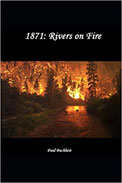
 |
The main crises presented in this multi-dimensional work are the Great Chicago Fire and the significantly more destructive burn, the Peshtigo fire. The story, which is given credence as a historical novel not only for its dramatic and factual rendering of past events but also the inclusion of actual people such as a mentor, "Dr. Bain," centers on a couple named Liz and Robert.
Well in advance of many women of her own or any modern time in Western culture, Liz, like her partner, is studying neuroscience. The couple's journey begins in England, and science, fate, or perhaps love takes them to Chicago for further study and other revelations. Throughout their changes and personal discoveries, the couple sustains a belief in themselves that propels them to success. However, their greatest challenges await them when Liz is facing the fire in Chicago and does not know the fate of Robert, who is in Peshtigo.
The author manifests his ability to skillfully weave many aspects of life and perspective into the book. There are keen observations about class and ethnic prejudices and exclusions. One example is the scarcity of food the Irish passengers have access to during the trans-Atlantic crossing. General socioeconomic and environmental conditions are part of the saga as well. Love, hope, work, and the forces of nature are entwined throughout, as is the ability to experience destruction at the most visceral level. Ultimately, societies recover from catastrophes, learn and change somewhat, and, ultimately, adapt in order to survive. The author deftly shows that thought, love, and care are a part of that adaptation.
RECOMMENDED by the US Review
Next Focus Review
Previous Focus Review